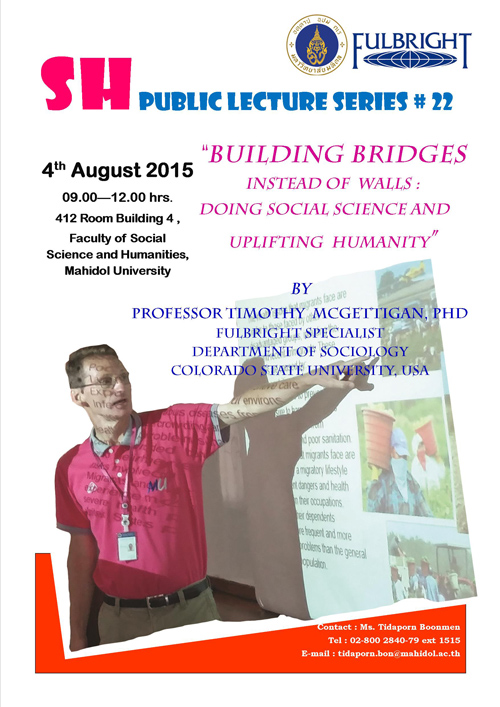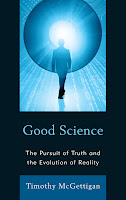Not so, claimed postmodernists. Under the guise of truth-seeking, postmodernists contended, science had woven a worldwide web of deceit. Certainly, some scientists might have been earnest believers in admirable principles; however, the net effect of scientific progress did little more than aggrandize the West at the expense of the downtrodden. And the prime culprit for those dark deeds was none other than the concept of truth.
Whereas scientists tended to view truth as a benign standard against which to gauge scientific progress, postmodernists argued that truth was an evil instrument of cultural discipline. Ideas which complied with Western truth standards merited approval, whereas ideas that challenged the modernist truth regime were subjugated and marginalized.
As a remedy, postmodernists advocated the end of truth. In this way, Western bias could be dethroned and all of the ideas that had been marginalized by modernism would finally get a fair hearing. Of course, as Sokal illustrated, if we abandon truth, we also abandon rationality. In a world of postmodern relativism, anything goes. Without truth standards, there is no way to distinguish between good and bad ideas: all ideas are equally valid. Which is a really bad thing--unless you're convinced that Hitler and Stalin were visionaries.
I must admit, I was perfectly happy to see postmoderism implode. Postmodernism was a gutless theoretical movement that arrogated unto itself the right to criticize everyone else's ideas while failing to produce any worthwhile ideas of its own. The best part was that, throughout its meteoric rise, postmodernism constantly propounded the imminent demise of modern science. To that, all I can say is "Ask not for whom the bell tolls . . . " Clearly, it would have been more accurate for postmodernists to predict their own demise. However, accuracy was never a priority among postmodernists.
So, where does that leave us?
Irksome as it may have been for postmodernists, science has forged ahead--before, during and after the postmodern interlude--with nary a hiccup. The biggest threat to science during the past couple of decades was the Bush Administration. Compared to Dubya, postmodernism was like a gnat on a water buffalo's backside.
If we can thank postmodernism for anything, it is for refocusing attention on the knotty issue of truth in science. Rightfully, Karl Popper should get most of the credit for problematizing the concept of truth. Of course, Popper took a much different view of the role that truth should play in humanity's never-ending problem-solving endeavors. Still, Popper made it clear that truth was not nearly as straightforward a phenomenon as most scientists, particularly positivists, liked to think.
Truth is a challenging subject. Many people, whether they describe themselves as scientists or not, might insist that truth is nothing more than a description of facts. For example, it is true that the sun rises in the morning and sets in the evening. At first glance, such a definition seems perfectly reasonable: truth should correspond with facts. However, the danger of such a definition is that facts are not always what they seem. Take, for example, the fact that the sun rises and sets on a daily basis. Although that statement offers a plausible description of certain facts, nevertheless, it is not true. The sun does no such thing. Based upon what astronomers have learned over the past several centuries, we know that the sun does not orbit the earth. Instead, the earth's rotation tends to instill the false impression that the universe revolves around earthlings. Our real relationship with the cosmos is very different. Additionally, for those who dwell near the earth's poles, rather than rising and setting on a daily basis, the sun often appears and disappears for months at a time. Consequently, facts often look very different depending upon one's perspective.
That said, it is important to emphasize that there is an essential relationship between truth and facts. In other words, one can't say anything truthful without reference to verifiable facts. Thus, I might claim that I have spotted the Sasquatch in my backyard, however, unless I can produce hard evidence of such a mythical visit, no one should believe a word I say. Good scientists certainly wouldn't.
Typically, good science can be understood as knowledge-seeking activities that assert a very clear linkage between truth and facts. Thus, for the most part, good scientists tend to view ideas that are not supported by facts (e.g., Sasquatches popping in for tea) as fantasies. Indeed, imaginative humans have a penchant for dreaming up all sorts of notions that, scientifically speaking, are rubbish. Consequently, good scientists usually draw a sharp distinction between facts and fantasies. Good science is devoted to the former and dismissive of the latter.
In important respects, this perspective is entirely justifiable. Facts matter. However, I argue in Good Science that scientific progress is often contingent upon seeking truths that lie beyond established facts.
In other words, fantasies can often inspire scientific progress that facts might otherwise impede. Often, in the most surprising ways, in the process of seeking truth, science has discovered new facts --and sometimes invented new facts (e.g., cures for age-old, previously irremediable illnesses; atomic particles that can be manufactured in laboratories, but that do not exist in nature; genetically engineered plants and animals in the form of GMOs; synthetically re-engineered, IT-mediated versions of time and space, such as cyberspace, etc.)--that have instigated profound transformations in the nature of reality.
In brief, science has routinely transformed reality by uncovering new truths and facts that have repeatedly transformed fantasies into reality. With the help of science, humans have repeatedly transformed the most far-fetched fantasies (e.g., plumbing the deepest depths of the seven seas, achieving aeronautically-engineered mastery of the skies, and, indeed, becoming the first terrestrial species to defeat gravity and redefine ourselves as extraterrestrials) into everyday realities. In doing so, science has achieved an unparalleled status as the most wide-ranging and effective vehicle to manufacture beneficial social change--in other words, Progress--that humans have ever conceived.
Let postmodernists stick that in their pipes and smoke it.
Although critics of science will surely point out that the world is plagued by seemingly insoluble problems--many of which have been either invented or exacerbated by science (e.g., overpopulation, pollution, global warming, nuclear nightmares, etc.)--I argue that crises have always been endemic to human civilization. In my opinion, the clearest path to the brightest future will be for scientific truth-seekers to pursue the most challenging problematics that the human imagination can invent and, thereby, commit the human race to a never-ending process of redefining reality.






